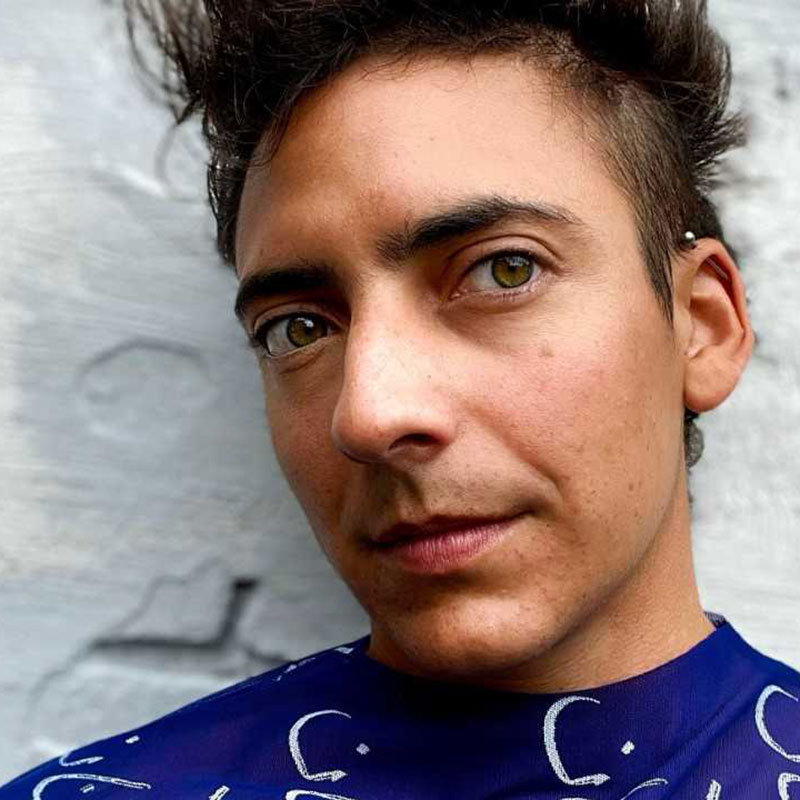
Editor’s Note: Welcome to National Poetry Month. Twice each week in April, KQED Arts & Culture will present a poem by a Bay Area poet. This series is curated by Rightnowish host Pendarvis Harshaw, who also speaks with each poet about their work.
Andrea Abi-Karam, ‘POETRY AS FORCES,’ AFTER Cecilia Vicuña
The “about to happen” / “poetry as forces”—when Cecilia Vicuña says that the lies (the words, the language) of the Chilean dictatorship murdered & tortured thousands of people I remember the power of the word & i remember the power of poetry—“made of forces”—that holds something in the action of language—material consequences can occur—not always—literal action is necessary but the line between language & action no longer feels quite as precise as the street vs. the aftermath—an emergence of literature—unrestrained
i ask questions like
how to weaponize my own body
or what’s left
of it how do we weaponize our selves
how to weaponize the poem (words as weapons)
give the poem teeth
overflow its vacancies
with sharpnesses
momentary, transitory criminal aesthetics
an unpublished sketch
of affinities
explicit revenge fantasy
& pride orgy
accumulation becomes
a book
a constellation of bruises
a blockade
a dance party
on the freeway
Andrea Abi -Karam alongside, from
within, erupting
out of
we sharpen
our teeth
& make attempts
glass breaking
disruption
simultaneous
…
Pendarvis Harshaw: What specifically inspired this piece?
Andrea Abi-Karam: “POETRY AS FORCES” AFTER Cecilia Vicuña draws inspiration directly from the revolutionary life and work of oral performer, poet, and visual artist Cecilia Vicuña, looking towards the movements and interventions her work has been a part of in the face of the Chilean dictatorship (1973-1990) and seeks to apply those interventions to a contemporary context. One of the many elements I love about Cecilia Vicuña’s performances is that they are collaborative with the audience and the environment around her—she invites everything in to participate. This invitation embraces spontaneity, disruption, and adaptation to the predetermined performance and revels in the possibility of collective force.
In the face of injustice, what can words and poems do?
I believe that action is necessary to combat injustice, and that poetry can act as an accomplice to that action—but can’t stand alone against it. This is something that Kay Gabriel and I deep dive into in the introduction to We Want It All: An Anthology of Radical Trans Poetics (Nightboat Books, 2020).
How does your identity inform your art?
I write extensively from my own experience where my multitude of identities as queer, trans, and Arab American is infused into everything, but is not always the headlining subject. I write a lot about the dangers and necessity of being visibly queer and trans in public—I feel it’s important to demand space for queer and trans revelry in public space, and in the face of danger, friendship and collectivity prevails. I also sink into the SWANA histories and literary legacy that I am a part of, and work to draw attention to post-9/11 state and military violences. Some writers that I’m endlessly inspired by are Etel Adnan, Solmaz Sharif, Marwa Helal, George Abraham, and Fargo Tbakhi.
Where are you from and where can people find more of your work?
I grew up in Connecticut and have lived in Boston, Oakland, and New York. I came of age as a trans person and a poet in Oakland. Kelsey Street Press in Berkeley published my first book EXTRATRANSMISSION (2019), which is a critique of the U.S. military’s involvement in the War on Terror. In the fall of 2021, Nightboat Books published my second book Villainy, which reimagines militant collectivity in the wake of the Ghost Ship fire and the Muslim Ban.
![]()
Keep up with events and other activities at Andrea Abi-Karam’s website or Instagram.

